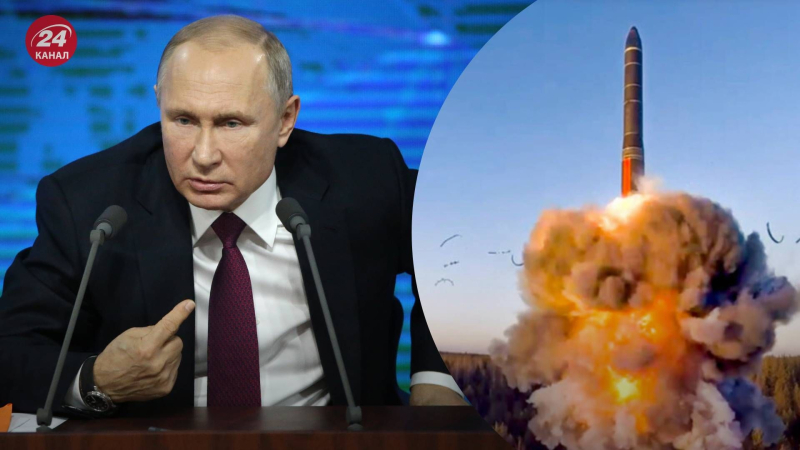“The most dangerous phase of the war”: AP issued a warning amid Putin’s announcement about nuclear weapons Margarita Voloshina What Putin's Statements About Nuclear Weapons May Indicate/Collage 24 Channel The day before, Vladimir Putin assured that Russia does not need to use nuclear weapons to wage war on Ukrainian territory. However, he addressed Western countries, emphasizing that they should not think that he would never use them. Associated Press writes that the countries of the North Atlantic Alliance are trying in every way to help Ukrainian troops in this fight of attrition. And it was at this time that the “nuclear message” was heard from the Kremlin, which could become evidence of the most dangerous phase of the war. Russia recently conducted exercises involving tactical or live nuclear weapons in the south of the country and in Putin-friendly Belarus. Videos released by the enemy defense establishment showed Iskander launchers, nuclear-capable combat aircraft, and sea-launched missiles. Of course, what Russian propaganda called Such exercises are a response to Western actions and statements about the likely deployment of NATO troops in Ukraine and providing Kyiv with the opportunity to use longer-range weapons to carry out limited strikes on the territory of the aggressor country. Senior Researcher Heather Williams, a fellow at the Washington Center for Strategic and International Studies, says relying on nuclear threats and signals is a persistent trend in Russia's activities amid the war in Ukraine. Russian leaders may believe there is more at stake in Ukraine than NATO, and nuclear threats are one way to signal their commitment to winning the war in hopes of deterring Western intervention, says scientist. Since the outbreak of full-scale war, Putin has repeatedly invoked nuclear threats to warn the West against intervening in and helping Ukraine. The United States and the Alliance criticized the nuclear saber rattling, but said they did not see any changes in Russia's nuclear capabilities that would require an appropriate response Following the occupation army's failures, the dictator insisted that Moscow was ready to use “all means” to defend Russian territory, fueling fears that Russia would use nuclear weapons to counter the advance of the Ukrainian Armed Forces and Kyiv's confidence. However, the Kremlin master soon softened his rhetoric somewhat after Ukraine's counteroffensive in 2023 failed to achieve its goals. Amid Russia's recent successes, the dictator declared that Moscow does not need nuclear weapons to win in Ukraine. At the same time, he warned that Kyiv's strikes on the territory of the aggressor country using Western longer-range weapons, in particular ATACMS, would mean a serious escalation. In May 2024, Russian radars were repeatedly hit by Ukrainian drones. One of them, according to satellite images, damaged a radar in the south of Krasnodar Krai. Another was aimed at a similar facility in the southern Urals, about 1,500 kilometers east of the border. Both sites are part of Russia's early warning system for intercontinental ballistic missile launches thousands of kilometers from the border. Moscow and Washington rely on such systems to track each other's launches. The publication writes that strikes on radars could qualify as triggers for the use of atomic weapons in accordance with Moscow's nuclear doctrine . Russian hawks have called for a decisive response from the Kremlin. Western opponents” to achieve victory in Ukraine. Putin reacted cautiously, saying he saw no security threats that would justify the use of Russia's nuclear arsenal. At the same time, he noted that Moscow is considering changes to its nuclear doctrine. There are calls in Russia for changes to the doctrine that Moscow could use nuclear weapons in response to a nuclear strike or conventional attack, which would threaten the “very existence” of the Russian state.< /p> Some so-called “hawks” argue that this threshold is allegedly too high, leaving the West with the impression that the Kremlin will never touch its nuclear arsenal. After the West allowed Ukraine to strike Russian territory, Putin threatened to retaliate by providing weapons to Western opponents around the world. This statement was made during his trip to the DPRK, where he signed a mutual defense pact with North Korea. The dictator also assured that Russia would begin production of medium-range missiles prohibited by the pact Cold War era, which Washington and Moscow severed in 2019. Such nuclear-capable missiles are considered particularly destabilizing due to the speed at which they reach their targets. Western troops, if any are transferred to Ukraine, as well as attacks on military supply centers in Kiev on the territory of NATO member countries. At the same time, experts do not exclude the possibility of a threat to military bases in the United States. In addition, Russia may threaten nuclear strikes on NATO facilities in Europe in order to “sober up the enemy and force him to the negotiating table.” 
What is hidden behind Putin's rhetoric
Changes in Russian nuclear doctrine
'Most Dangerous Phase of War': AP Issues Warning Amid Putin's Nuclear Weapons Statement
109

